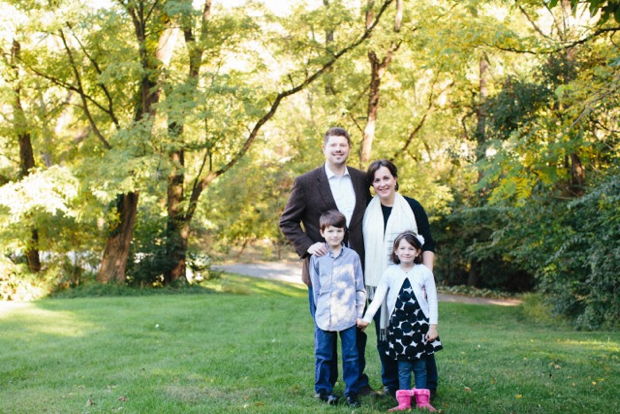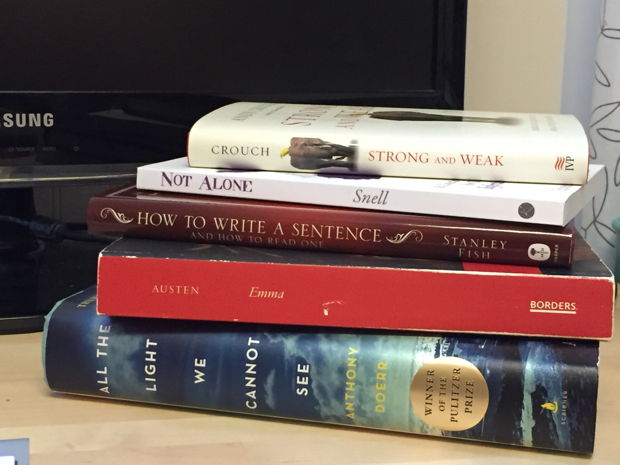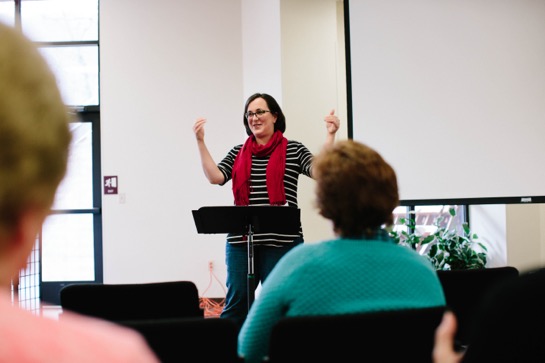Anna, I am thrilled to have you taking over as editor of The Well, and I would love to have our readers know more about you as you enter this position. Can you tell us where you're from, and tell us a bit about your background?
I grew up in Mobile, Alabama, and went to college in Chapel Hill, North Carolina, at UNC (Go Tarheels!) [Laughs.] I spent most of my free time in college working with high school students, and after college I worked in youth ministry in local churches. Then I attended Beeson Divinity School in Birmingham with the intention of going on to get a PhD. But I met Jeff, my husband, and we married and ended up coming on staff with InterVarsity Graduate & Faculty Ministries instead.
Had you been involved with InterVarsity during your time in North Carolina?
No, neither one of us had any InterVarsity background, which is pretty uncommon for staff. While we were in divinity school, we considered the ways that we might minister, and were attracted to working with either college students or in a college town. We really love the university and always have. We found out about Graduate & Faculty Ministries because a former staff member, Robbie Castleman, came and gave a lecture at Beeson. So we looked on the InterVarsity website, found some job listings, and applied. [Laughs.] We ended up joining staff in Chapel Hill in 2004.
Great. So, at one point you were interested in getting a PhD. Was the goal to teach?
Yes. So I've gone back and forth about this dream since college, this desire to be a professor, teaching religion or theology. That's changed over time from religion to theology. I was a little naive. I thought that I could go to an evangelical divinity school and then end up teaching religion in a secular university. I think that's probably not very likely now that I know more, but that was my original goal.
You went from working as campus staff with graduate students to working for Women in the Academy & Professions. Are there things there that have satisfied that desire that you had for being a faculty member? Are there some things about your work that you find really touch some of those passions that you have?
One of the reasons I'm really interested in the work of Women in the Academy & Professions is that I've been in an academic field that is male-dominated, both in terms of the student body and the faculty, and I've seen some of the struggles for women that come along with that.
When I was working in campus ministry, spending a lot of time with students, I found myself relationally exhausted, especially after my kids were born. I kept wanting to spend more time on big ideas, on more research and writing, or teaching. One of the things that I've really appreciated about my work with Women in the Academy & Professions is that the work has a mix of ideas and relationships. I have the opportunity to learn new things all the time, to develop writing and editing, and to help create good content, as well as the opportunity to hear from women, to learn their stories, and to connect them with others. It's not the same as being a professor, but it is very satisfying.

You've been doing writing and editing these last several years alongside of your work with Women in the Academy & Professions.
Yes. After years of writing academic papers, I have switched in the last several years to writing more popular level work, and I’ve written a couple of essays that have been published in anthologies: One on infertility in Not Alone, a resource for people struggling with infertility and miscarriage; and one about Epiphany, in Let Us Keep the Feast, describing how to celebrate the liturgical calendar at home. Those have been really fun projects. And then I've been writing in some online forums. I would love to continue to develop my writing.
And you've been doing editing professionally.
Well, I started out as a writing instructor for seminary students, and though not technically editing, it has very similar characteristics — communicating with writers what's working and what's not, giving suggestions, and trying to bring out what's most important through the writing. In the last few years, I’ve done more formal freelance editing and have learned a lot about the different types of editing, the needs of writers, and how all of the pieces fit together. It's been interesting to see how all of these different skills and opportunities have fallen into place just in the last few years.
I’m so glad to hear that! You seem to have had an ideal preparation for this position: experience on InterVarsity’s graduate and faculty staff, writing, editing, and then staffing
The Well’s Facebook page. Regarding your work with the Facebook page, let me shamelessly quote Kate Shellnut, editor of her.meneutics: “Somebody at
The Well knows the way to my heart because I can’t stop clicking on the articles they share on Facebook each day. Alongside their original content, they curate a steady stream of news, inspiration, and blog posts relevant to the lives of working women.” That was you! What did you find satisfying about doing that work?
I think I found it really satisfying that so much of that role was about learning new things. Each week, I would sit down and read articles, and I considered it a service to busy men and women who didn't have time to crawl through [laughs] all of the many new articles each week. I would highlight the ones that I thought were the most meaningful, especially for our audience, women in the academy and professions. Posts might be about how to function well at work, or how to lead well, or something that's specific to higher education that academic women especially might need to know. We've focused on the plight of adjunct professors. We've tried to highlight ways that we can work better for racial justice. There are all kinds of different things that we've featured at the Facebook page that have been really helpful to me and I hope have been helpful for other people.
Absolutely. As you go into this position of editing The Well, academia is in a different place, it seems, than it was eight or nine years ago, when The Well came online. What direction would you like to head in? Where do you want to press in with articles or writing for The Well?
I definitely want to keep the quality of writing that has been developed over the years at The Well. One of the things I think is a real strength is that the articles are well-written and high-quality. I think that is a gift to readers. It's clear that there's been careful attention paid to each article. I really appreciate that. I would love to see us press in more to issues of intersectionality, where women of color are struggling in particular, addressing some of their needs and working for justice for women of color on campus. I would love for us to have more writing by women of color at The Well. We are working on that, and I’d love to see us keep going in that direction.

Yes! What are you yourself reading these days, and are there topics that you're writing about? You spend so much time reading online for The Well, do you have time for outside reading?
[Laughs] I actually have started trying to read on Saturday mornings as a way to practice Sabbath. Because my husband's a pastor, we don't have restful Sundays. And so one of the practices that I've started just this school year is reading for fun on Saturday mornings. I have not always been a big fiction reader, but I’m moving towards more fiction. So, recently, I've read Z, a novel about the life of Zelda Fitzgerald, which I found really interesting, especially in thinking about women's lives today. She had a complicated life. It was hard being married to a famous novelist, and she struggled with forming her own identity. And I think some of those themes are certainly relevant today. And Emma — I just read Emma for the first time, which has a lovely heroine.
But I do still enjoy nonfiction. Recently I read Strong and Weak, by Andy Crouch, and I'll be writing a review of that, and How to Write a Sentence, by Stanley Fish, which sounds like a really boring book, but it's delightful and really fun, especially if you appreciate grammar. [Laughs] And I do.

How about speaking? Do you do much speaking and is that something you enjoy or get called on to do?
I love, love speaking. I've heard people say that there are writers who speak and speakers who write, and I consider myself a speaker who writes. I much prefer speaking to writing. I have had many opportunities to speak over the years, but I haven't done as much speaking since we moved to a new city two years ago. But I'm actually going to be speaking soon at my church's women's retreat.
Wonderful! What is your topic?
It's about sacrifice and self-care. So it's about thinking through how we as women make choices. When do we sacrifice our own needs for others, and when do we need to choose to care for ourselves.
It sounds like a good article for The Well.
I'm planning to turn it into an article [laughs].
That sounds great. Well, Anna, I am, as I said before, I'm thrilled to have you take this position. I think you're so beautifully suited for it, and I am just excited to see where you will take The Well, and to hear from the writers who you'll bring along. We are so grateful to God for your position here. So thank you, and we'll look forward to hearing much more from you.